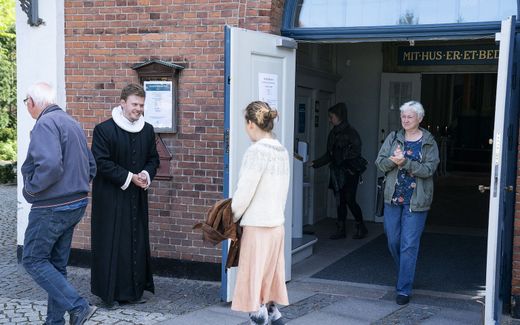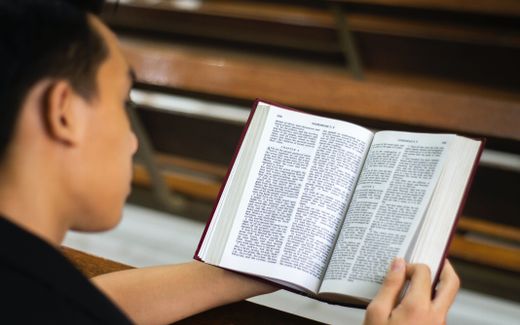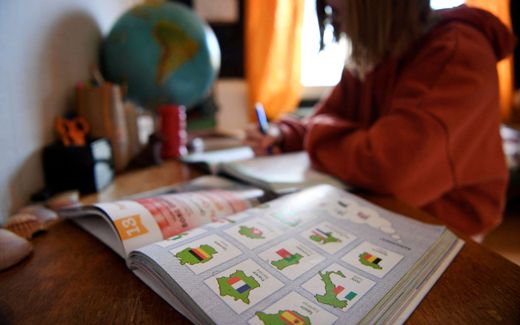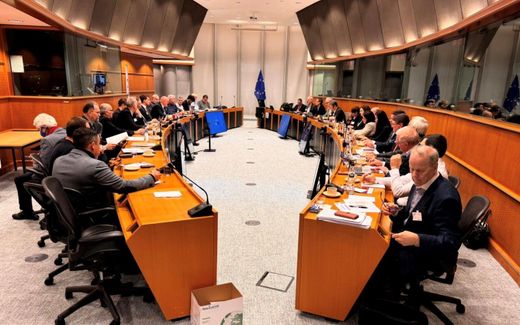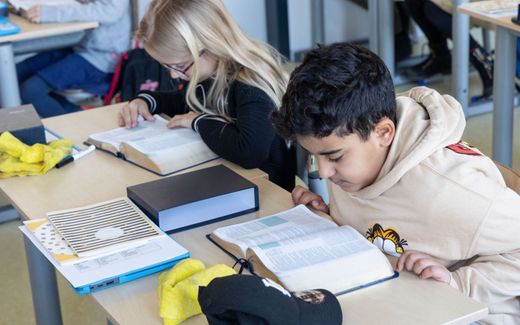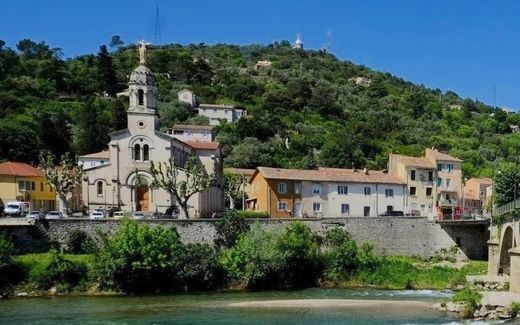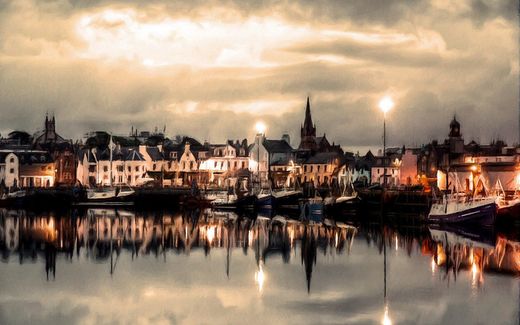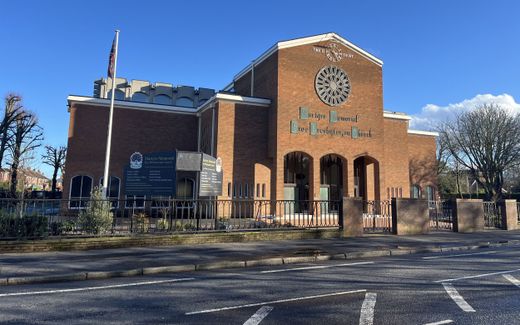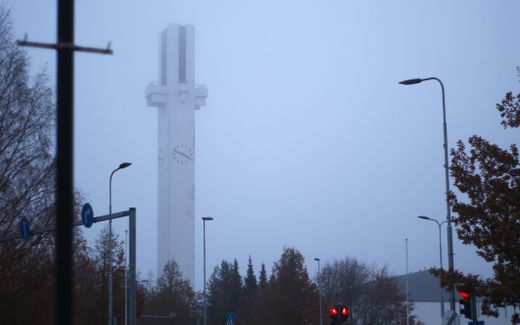Biblebelt feature: How the Dutch enclave is holding breath for Gen Z's future
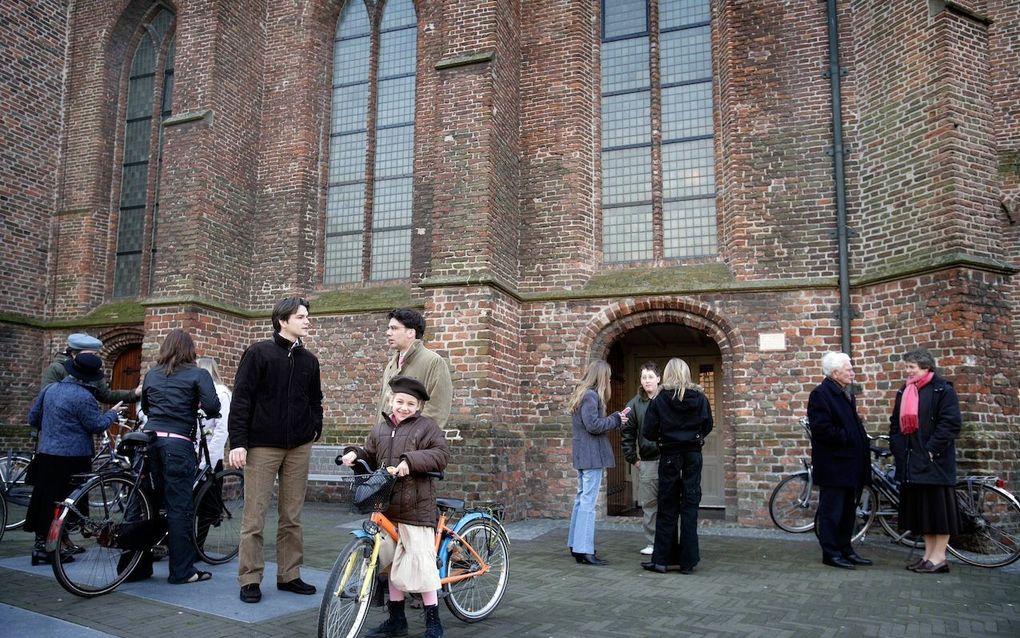
Churchgoers coming out of a service from the Old Church in the centre of Barneveld. Photo RD, Sjaak Verboom
Western Europe
A Christian enclave in a secular society. Barneveld is typical for the Dutch Biblebelt. Young families move to this place because of the Christian schools and Reformed churches. How an American journalist goes on safari in a world of pastors, teachers and chickens.
Stay up to date with Christian news in Europe? Sign up for CNE's newsletter.
In Barneveld, families are often biking together. That is what you see in many Dutch small towns. And you see it here, too, in this Biblebelt place.
Walking toward a local ice cream parlour, the sweet aromas of waffle cones and dairy cream draw me into the shop. After ordering a lemon sorbet, I sit near a group of school-aged girls who chat and laugh as they lick their ice cream.
The air is cool, saturated with the previous rains, but the sun filtering through the clouds is enough to warm your body. Barneveld may not be the first choice on a traveller's itinerary like myself, but its small-town appeal and robust Reformed legacy make the nearly 60,000-population town significant in the Dutch Biblebelt.
Further down, you can see local boutiques and typical Dutch supply stores such as Kruidvat. I walk behind the Oude Kerk to get a closer view of a stand selling an array of Dutch cheeses. Behind the church, I also see a statue of Jan van Schaffelaar, who jumped from the Barneveld steeple in the 15th century. Looking away from military personnel, you can view other statues that pay tribute to the Barneveld Chicken or Barnevelder, which can trace half of its roots to "Shanghai birds" imported from Asia.
While various chicken depictions seem ubiquitous all over town, you cannot avoid Barneveld's strong Reformed presence in the Dutch Biblebelt. The town is well-recognised for having Calvinist churches of different denominations attended by thousands and for its Reformed education centre, Van Lodenstein. Now that Dutch society is nearing the mid-2020s, these institutions are having to adapt to the digital Gen Z that is increasingly saying goodbye to the church.
The Protestant PKN Church is the largest Christian denomination in the Netherlands. There are more than 30 churches in Barneveld's municipality. In the adjacent village of Voorthuizen, there are more churches than schools, Rev. Atse Buursema says to Omroep gld, who is a minister of the Dutch Reformed Church in Voorthuizen. The traditionally national Dutch Reformed Church (NHK) became part of the PKN (Protestant Church in the Netherlands) in 2004.
Pastor Buursema also notes in the article that many Reformed churches in Barneveld have to change with the current times. In the past, the church was more "introverted," but now it has become more open and focused on making a difference outside its "internal community."
Addie Lassche is an IT specialist who lives near Barneveld. He acknowledges that local churches have become more community-oriented in recent years. We talk inside one of Barneveld's largest Reformed churches, De Hoeksteen, which belongs to the more conservative denominations. Lassche tells me that he lives in one of Barneveld's nine neighbouring villages and is currently working on a local initiative to combat excessive alcohol use in his community.
He explains that the church has made a point of reaching out by holding local meetings with non-churchgoers. Entitled Samaria, the group offers a chance for participants to have their questions about life and their beliefs about God answered over coffee or tea.
"Luckily, I see a tendency, a development that more and more churches say, 'we want to be open to the people living in the same village.' That is so important," he says.
While some area churches are opening their doors, the level of participation varies. Rev. Leendert Plug is Mr Buursema's colleague in Barneveld and pastors the 6,000 members of the Reformed Church (Hervormde Gemeente). He says that only 50 per cent of the congregants regularly come, although the church expects better attendance.
One key characteristic of a people's church is the many paper members. Coined in Dutch as "members on wheels," he says that these specific congregants are seen when they are being baptised or at their funerals.
Although 6,000 are logged on attendance sheets, around 2500 participate regularly in the church's services. "At this time, we see people who don't come very often. They excommunicate themselves from the church," he says. "It will never be our choice to excommunicate." Plug’s congregation is part of the PKN branch of the Reformed part of the Protestant Church and has 1,4 million members.
The Protestant Church in the Netherlands also has over 1700 congregations nationwide. Known as the "people's church" because of its high numbers on church counts, the PKN became one of three separate Protestant churches to unite in a unification process from the early 1960s up to 2004.
Typical for the Dutch Biblebelt is the high number of women who walk daily in a skirt or dress in accordance with traditional or orthodox Reformed communities. The Biblical teaching that men's garments are associated with wearing pants (Deuteronomy 22:5) still applies to many churches, which say a woman should not wear a man's clothing. During the liturgy, women cover their heads in accordance with 1 Corinthians 11.
In Plug's church, women can come without a hat or wear pants if they want. He says what matters most is that they are welcomed without any fear of judgement. As soon as congregants walk through the doors, Plug adds, it is important for them to experience an entire church with lots of children and singing Psalms.
While Barneveld continues to have several Reformed churches and high attendance rates, many young adults across the Netherlands are leaving the church and its Christian faith. According to the Holland Times that cited a study from the Dutch Netherlands Institute for Social Research (Sociaal Cultureel Planbureau), the number of those who never attended a church service went up from 53 per cent in 1983 to 69 per cent in 2018. What is more, the number of young people who identify as atheists shot up from 16 per cent in 1990 to 29 per cent in 2018. At least 37 per cent consider themselves as "non-religious."
Rev. Marieke Den Braber is head of the less conservative Protestantse Gemeente (PKN congregation) Barneveld. Ms. Den Braber knows these national trends and acknowledges that church attendance is changing, especially in her community. Den Braber's congregation stands as an exception within Barneveld. Many local churches (not just Reformed) only have male office-bearers. Yet, that custom has not stopped her from leading her church.
In Den Braber's four-minister congregation, at least 3,000 members are enlisted on paper, and around 1,000 are considered active members. After the services, the church holds a social hour with coffee and tea, which, she says, remains one of the most important moments in building community.
Similar to Plug's church, attendance remains a challenge despite efforts to encourage participation. Many who come are seniors, along with some young families. Overall attendance remains inconsistent, with some present only a couple of Sundays a month. "It's difficult to build good relationships and community when they don't attend regularly," she says.
Sometimes, she gets complaints from older congregants about the messages not emphasising sin enough. In years past, more traditional Reformed congregations have leaned into so-called fire-and-brimstone preaching along with turn-or-burn messages.
However, this is not the case with Den Braber's church, which believes that emphasising the tough love of God amid sin may be better. While she does not believe in avoiding the subject of sin and judgment, Den Braber wants to present a different way of bringing up the fall of humanity to today's youth. "God is a loving Father, and no matter how much you love someone, you have to be firm, and there's punishment if necessary. He loves us, but sometimes he has to punish," she says.
While their church engages in sustainability projects to protect the environment, some may wonder if these efforts belong in the church or stay in the Parliament. Den Braber leaves me with this remaining thought about the Christian church, "Why shouldn't a church be political? Politics is the way a country is ruled. It is not our focus to influence politics, but it is the people of the church whom we can inspire," she says.
Politics is not that far from the church-going Barnevelders. Several Christian parties are represented in the city council, with the Reformed SGP being the largest here. While I wanted to get a better political picture of the town, many leaders did not respond to my requests for comment. Barneveld is increasingly getting more non-Dutch nationals, but the community's social landscape is chilly for foreigners compared to nearby cities such as Wageningen and Amersfoort.
While phoning Barneveld SGP representatives, one representative hung up on me after asking in Dutch if he spoke English before my interview. When I asked another SGP representative the same question, he answered "no" and quickly ended the call. Two others should have responded to my messages.
The Reformed Van Lodenstein College is better able to handle a foreign journalist. My visit there gave me a good snapshot of Reformed Christian education in the area. A college in the Netherlands is not a university like it is in my native country, the US. Rather, it is a school for secondary education where the students are between 12 and 18 years old.

Named after the reverend and seventeenth-century poet Jodocus van Lodenstein, its logo is inspired by a line in one of his poems. “Wat ik denk en doe / behoort de hemel toe” (What I think and do/ belongs to heaven). When you look closely at the logo, it contains five lines and a butterfly resting on the outside. The five lines that form a circle represent their five locations, one being Barneveld. The lines, however, are not closed as this shows a need to look from the inside out, while the butterfly represents youth that are vulnerable yet full of life, its website's description says.
When I walked behind the school and into its main entrance, the students were getting released for the day. There, I met Gert van Leeuwen, a member of the Board of Directors for Van Lodenstein College, and Dinant Geuze, a team manager and teacher at the college. Around 914 students attend the Barneveld location, while the four other campuses outside the town are for those 12-18 years old.

When it comes to funding, all schools receive government subsidies. According to the well-known Article 23 of the Dutch Constitution, schools of all "directions" receive state funding, although the conditions for this funding are a matter of continuous debate. Six Reformed churches have also partnered in the school's creation. Once students in Barneveld move on to the upper secondary grades, they have to go to the nearby cities of Hoevelaken or Amersfoort, which take an average of 50 minutes by bike. The staff are launching another school in Barneveld for the upper secondary grades that is set to open in 2028.
Although both Van Leeuwen and Geuze acknowledged that more families are emigrating from South Holland (The Hague and Rotterdam), most come from Barneveld's surrounding towns and villages. "We can say there is a slow movement from the west to the east. Christians are leaving the cities and moving to the predominantly Christian villages. It is a very gradual process," Van Leeuwen says.
House rules require girls to wear skirts or dresses, and mobile phones are not allowed in classes. Students have two hours of religious instruction per week, at minimum, that includes topics in Biblical knowledge, Reformed church history, and defending the faith. Every school day starts with a small moment of worship.
If they also want to pursue a trade or vocation track, students can receive training for that specific field, including horticulture or senior care. Those who show academic potential can go the university preparatory route or participate in their education programme for gifted students. While students are given the choice of what to study, reading remains important throughout their instruction.
"We are working on digitisation and promoting reading culture because we are losing that. We try to offer more practice-oriented education for the 'doers' and more depth and broadening for the 'thinkers'," Van Leeuwen says.
While they may use a curriculum found in non-Christian schools, the teacher is responsible for adding a Christian identity and explaining the material from a Biblical perspective. One exception is their biology curriculum, where additional explanations on a Reformed worldview are given. Even mainstream issues such as climate change can be opportunities or lessons in caring for God's creation, Geuze says.
After our conversation, Geuze gave me a school tour and showed me the upstairs workspace behind the glass. Some students were still working at their desks, and a teacher sat towards the middle to supervise their activities. As we kept looking through the window, he said that the open floor plan is intentional, as students become less ashamed of what they are doing.
Downstairs, they have a care room for those with autism and other special learning needs. Geuze mentioned earlier that more students are coming in with extra distractions, such as blended and broken family situations.
In another hall were three gyms featuring climbing walls and martial arts mats. He explains that current government regulations require at least two hours of physical education per week for those under 12 and three hours for those over 12. He also agrees that, as Christians, we need to strengthen the body as it is a temple for God.
While Geuze talks about strengthening the physical body, Van Leeuwen discusses the mind. On his way out, Van Leeuwen pointed towards a poster that he believes is important for current and graduating students.
Four questions were arranged around a circle on the Burgerschap (citizenship) poster. Translated from Dutch, the main question, Who am I?, became divided into five more reflections: For God, my friends, my surroundings, for the school, and for the world? Van Leeuwen explains that whether students stay in Barneveld or go somewhere else, these questions help prepare them for the "greater picture."

"What has not changed is that we provide Biblical education, which permeates our education like a leaven. Every day, we can point out to the students the greater good reserved for those who fear the Lord. There are large church buildings in Barneveld. This means that Barneveld is a Christian enclave. In this community, we can provide Christian education in a free country. That's a great thing," he says.
Related Articles



